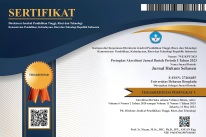Juridical Analysis of Land Execution at the Argamamur District Court according to the Land Law)
Abstract
The revocation of a favorable decision is a situational sanction not with the intention of being a reaction to an act that is morally wrong, but is intended to end conditions that are objectively unjustifiable. Withdrawal of provisions as sanctions is closely related to the nature of the provisions themselves. In respect of a binding decision, it must be withdrawn by the government organ that issued the decree, and it is only possible to do so as long as the statutory regulations are the basis for the determination. The type of research used in this research is normative legal research. According to Peter Mahmud Marzuki, legal research is a process to find the rule of law, legal principles, legal doctrines in order to answer the legal issues faced. Executing the court's decision called execution is regulated from Article 195 to Article 224 HIR or Article 206 to Article 258 RBG. However, at the present time (this description was made by the author long before PERMA No. 1 of 2000 was published), not all provisions of the aforementioned articles are effective. Articles that are still really effective apply especially Article 195 to Article 208 and Article 224 HIR or Article 206 to Article 240 and Article 258 RBG While Article 209 to Article 223 HIR or Article 242 to Article 257 RBG which regulates "hostages" (gijzeling ), is no longer treated effectively. A debtor who is sentenced to pay his debts based on a court decision can no longer be "held hostage" in an effort to force his relatives to make payments according to a court decision.
Downloads
Copyright (c) 2021 Ana Tasia Pase, Sandi Aprianto, M. Vikriawan

This work is licensed under a Creative Commons Attribution-ShareAlike 4.0 International License.






